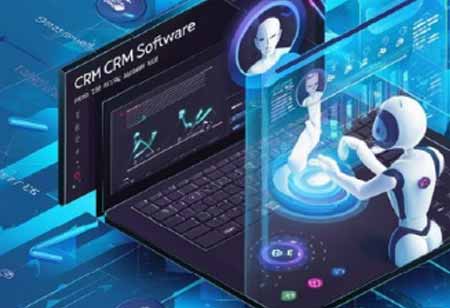THANK YOU FOR SUBSCRIBING

By
Banking CIO Outlook | Monday, June 10, 2024
Stay ahead of the industry with exclusive feature stories on the top companies, expert insights and the latest news delivered straight to your inbox. Subscribe today.
Customer Relationship Management (CRM) software has evolved into a crucial tool for businesses aiming to enhance customer interaction, streamline processes, and ultimately drive growth. As technology advances, the landscape of CRM software continues to shift, incorporating new trends and facing emerging challenges. This piece delves into the latest trends in CRM software and the challenges that companies encounter in adopting these systems.
The primary function of CRM software is to manage a company’s interactions with current and potential customers. It leverages data analysis to study large amounts of information about customers’ history with a company, aiming to improve business relationships, particularly focusing on customer retention and ultimately driving sales growth. As the business environment becomes increasingly digital, the role of CRM software is expanding and adapting to new trends.
One of the most significant trends in CRM software is the integration of Artificial Intelligence (AI). AI and machine learning algorithms can analyze customer data to predict future behaviors, provide personalized recommendations, and automate routine tasks. This intelligent automation helps in enhancing customer experiences by offering more tailored interactions. For example, AI-driven chatbots can handle customer inquiries in real-time, providing immediate support and freeing human agents to handle more complex issues. Predictive analytics, another AI application, allows businesses to anticipate customer needs based on past behaviors and preferences, enabling proactive service and marketing strategies.
Another emerging trend is the increased focus on customer experience (CX). Modern CRM systems are designed not just to manage customer information, but to enhance the overall customer journey. This shift is driven by the understanding that exceptional customer experiences are critical to building brand loyalty. CRM software now often includes tools for managing customer feedback, tracking satisfaction scores, and personalizing interactions at every touchpoint. By integrating these capabilities, businesses can ensure they meet customer expectations consistently and effectively.
The integration of CRM with other business systems is also gaining traction. As businesses utilize a variety of tools for different functions – such as marketing automation, sales force automation, and customer service platforms – the ability to integrate these systems with CRM software becomes crucial. This integration allows for a seamless flow of information across departments, providing a unified view of the customer. It enhances collaboration and ensures that all customer-facing teams are aligned in their approach and communication, leading to a more cohesive customer experience.
Mobile CRM is another trend that has been significantly growing. With the increasing reliance on mobile devices for
business operations, CRM systems have been adapted for mobile platforms. Mobile CRM applications allow sales and service teams to access customer information, update records, and communicate with clients while on the go. This mobility ensures that customer data is always up-to-date and accessible, enhancing the responsiveness and agility of the customer-facing teams.
Social CRM is also transforming how businesses engage with customers. Social media platforms have become critical channels for customer interaction, and CRM systems now integrate social media data to provide insights into customer sentiment and engagement. This integration allows businesses to monitor social conversations, manage social media interactions, and leverage social data to inform their customer relationship strategies. By understanding how customers interact with their brand on social platforms, businesses can tailor their approaches to meet the expectations of today’s socially-connected consumers.
Despite these advancements, the implementation and adoption of CRM software come with several challenges. One of the primary challenges is data quality and management. CRM systems rely heavily on accurate and comprehensive data to provide meaningful insights. However, many businesses struggle with data silos, incomplete data, and data inaccuracies. Ensuring data quality requires ongoing effort, from regular data cleaning and validation processes to integrating data from disparate sources into a unified system.
User adoption is another significant challenge. Even the most advanced CRM system is only as good as its users. If employees do not use the system effectively, the potential benefits are lost. Resistance to change, lack of training, and insufficient support can hinder user adoption. To overcome this, businesses need to invest in comprehensive training programs, demonstrate the value of the CRM system to users, and provide ongoing support to encourage consistent usage.
Customization and scalability are also critical concerns. Every business has unique needs, and a one-size-fits-all CRM solution may not be effective. The ability to customize CRM software to meet specific business requirements is essential. However, customization can be complex and costly, requiring specialized expertise. Additionally, as businesses grow, their CRM needs evolve. The chosen CRM system must be scalable to accommodate increasing amounts of data and more complex processes without compromising performance.
CRM software continues to evolve, driven by technological advancements and changing business needs. The integration of AI, a focus on customer experience, system integrations, mobile access, and social CRM are some of the key trends shaping the future of CRM. However, businesses must navigate challenges related to data quality, user adoption, customization, scalability, and security to fully leverage the potential of CRM systems. As companies continue to prioritize customer relationships as a key differentiator, the role of CRM software will undoubtedly remain central to their strategies, adapting to new trends and overcoming challenges along the way.
THANK YOU FOR SUBSCRIBING
Be first to read the latest tech news, Industry Leader's Insights, and CIO interviews of medium and large enterprises exclusively from Banking CIO Outlook
I agree We use cookies on this website to enhance your user experience. By clicking any link on this page you are giving your consent for us to set cookies. More info



